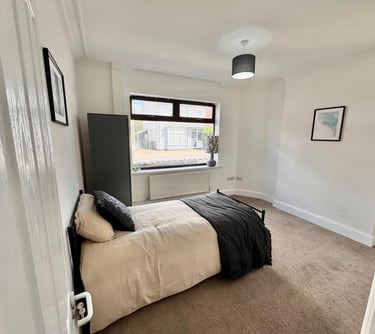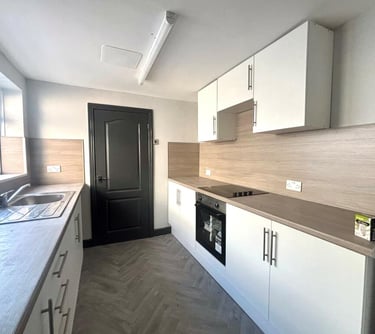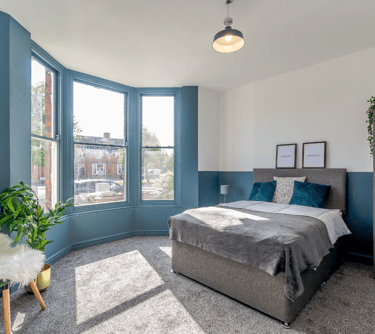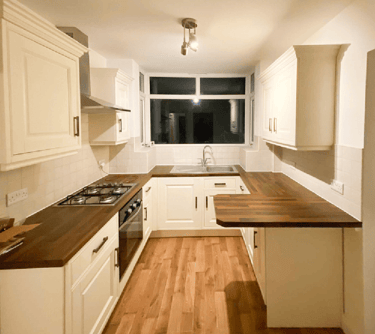
HMOs for Sale
High-yielding buy to let property let to working professionals or students
Looking to invest in HMO properties across the UK? Whether you're a first-time investor or expanding your property portfolio, Seven Generations offers exclusive access to high-yield, off-market HMOs. Our properties are sold fully licensed with management options in place and usually tenanted, ensuring a seamless property investment experience from day one.
Property Listings: Professional & Student HMO Properties
These listings show the types of HMOs we regularly help our clients purchase. While these have already sold, similar properties may be available. Speak to a broker for full listing information on current properties for sale.


Merseyside (SOLD)
Price: £180,000


Teeside (SOLD)
Price: £140,000




Property: 4-Bed HMO
Annual Rent: £22,800
Gross Yield: 12.7%
Tenants: Working Professionals
Status: Sold
Property: 4-Bed HMO
Annual Rent: £21,600
Gross Yield: 15.4%
Tenants: Working Professionals
Status: Sold
Property: 5-Bed HMO
Annual Rent: £30,000
Gross Yield: 11.8%
Tenants: Students
Status: Sold
Property: 4-Bed HMO
Annual Rent: £22,000
Gross Yield: 11.6%
Tenants: Students
Status: Sold
Lincolnshire (SOLD)
Price: £255,000
Cheshire (SOLD)
Price: £190,000
What is a HMO?
A House in Multiple Occupation (HMO) is a property rented out to three or more individuals who are not from the same household but share facilities like the kitchen and bathroom. HMOs are popular among students and young professionals seeking affordable accommodation.
Investing in HMOs can offer higher rental yields compared to traditional buy-to-let properties due to multiple income streams from individual tenants. However, they also come with specific regulatory requirements and management considerations. Depending on the size of the HMO they may also be subject to more stringent financial applications for financing products.
3+
9-10%
Average Gross Yields
Households Sharing


Why Invest in HMOs?
Houses in Multiple Occupation (HMOs) have become a popular investment choice for individual investors seeking higher rental yields and diversified income streams. They typically offer higher rental yields compared to single-let properties by renting out individual rooms to multiple tenants, driving their popularity amongst buy to let property owners. To learn more about HMOs as a property investment strategy you can read our strategy guide here
Investing in HMOs offers several compelling advantages. Here’s why many investors choose HMOs as their preferred investment strategy:
1. Higher Rental Yields
One of the key benefits of investing in HMOs is the potential for higher rental yields. Unlike traditional buy-to-let properties, where a single rent is collected from one tenant, HMOs allow you to collect rent from multiple tenants. This means a larger combined rental income. For example, a 5-bed HMO can generate significantly more than a typical single-family home.
2. Steady Cash Flow
Due to the multiple tenants occupying the property, the risk of full void periods is spread out. If one tenant moves out, the rent from the other tenants continues to support the cash flow. This is especially beneficial in areas with high demand for shared accommodation, such as near universities or city centres.
3. Capital Appreciation
In addition to strong rental yields, HMOs often see capital appreciation over time. As with any property investment, the value of your property may increase, and in some cases, more rapidly than standard single-tenancy properties.
Benefits of HMO Investments
While HMOs offer many benefits, they are not without challenges. Here are some key considerations before diving into this investment strategy:
1. Licensing & Compliance
HMOs are subject to specific licensing and regulatory requirements, and the rules vary depending on location. The properties must meet health and safety standards, and you must ensure that fire safety regulations are adhered to. Staying compliant can be a time-consuming task, but it is essential to avoid penalties and ensure the safety of tenants.
2. Property Management
Managing an HMO involves overseeing multiple tenants, dealing with tenancy agreements, maintenance requests, and potential conflicts. Many buy to let owners choose to hire property management services, but this adds an additional cost.
3. Higher Initial Investment & Refurbishment Costs
The initial investment in an HMO can be higher compared to a traditional buy-to-let property. Additionally, HMOs often require more extensive refurbishments to meet the standards required for shared accommodation. These costs should be factored into your investment plans.
Challenges of HMO Investments
Types of HMOs: Professional vs Student Tenants
While the property could be the same, the tenants renting the property can vary. The two most common are working professionals and university students. Depending on which type of tenants you choose to let your HMO to, there are advantages to both options.


Student HMOs
Situated near universities and colleges, student HMOs are in high demand during academic terms. While they may have higher turnover rates, the demand ensures minimal vacancy periods.
Advantages:
High occupancy rates during term times
Potential for premium rents
Predictable rental cycles
Professional HMOs
These properties cater to working professionals seeking shared accommodation. Located in urban areas with strong employment opportunities, professional HMOs often experience lower tenant turnover and stable rental income.
Advantages:
Longer tenancy durations
Wider option of suitable locations
Lower management intensity


Who should consider HMO investments?




For those new to property investment, HMOs can provide an attractive entry point with higher returns but can be more complex than single-family lets. Partnering with experienced professionals is often very beneficial.
Experienced landlords looking to diversify or enhance their portfolios can benefit from the robust cash flow and demand associated with HMOs, plus financing may be easier to obtain due to prior experience.
First-Time Buy to Let Investors
Portfolio Landlords
Financing Your HMO Investment
When it comes to financing your HMO investment, you will likely need to secure a specific type of mortgage. Here are the key financing options:
Commercial HMO Mortgages
Commercial HMO mortgages are tailored to the specific needs of larger properties rented to multiple tenants. These mortgages are usually for 6-bed properties and above, often factoring the rental income of the property into the valuation. They are often restricted to portfolio landlords with proven experience of letting to tenants.


Buy to Let HMO Mortgages
Some lenders may offer buy-to-let mortgages for HMOs, though this can depend on the number of tenants and the property’s classification. These mortgages tend to have slightly higher interest rates than standard buy-to-let mortgages due to the higher risks associated with managing multiple tenants.
For those looking to purchase properties quickly or in need of refurbishment, bridging loans can offer a fast solution. These short-term loans can be used to purchase properties before securing long-term financing.
Bridging Finance




HMO Compliance and Licensing: What You Need to Know
For those looking to buy an HMO property, understanding the compliance and licensing requirements is critical to ensure the property is legally habitable and profitable. Here are the essential compliance points:
HMO Licenses
Most HMOs require a license from the local authority to be legally rented out. There are three types of HMO licenses:
Mandatory Licensing – For properties with five or more tenants across two or more households.
Additional Licensing – Required for properties in areas that have been designated as requiring additional control by local authorities, such as Article 4.
Selective Licensing – Applies to entire areas where additional controls are needed for all privately rented properties, including HMOs.
Safety and Standards
HMO properties must meet various safety standards, including fire safety measures and regular electrical and gas safety checks. You must ensure the property meets all requirements and that your tenants’ safety is a priority.


Manchester, Liverpool & Leeds
Large urban centres along the M62 corridor in the North


University Towns
High student demand created by prestigious universities


Greater London
Large urban population surrounding the capital


Smaller Towns & Rural Areas
Lower tenant demand but less competition to purchase
These cities have seen an increase in demand for HMOs, especially near universities and business districts. The rental yields in cities like Manchester are competitive, making them attractive to investors. HMOs in these cities often cater to both students and professionals, resulting in high occupancy rates.
In towns and cities with large student populations, such as Nottingham, Sheffield, and Reading, the demand for student HMOs is high. Investors can expect consistent rental income throughout the academic year, with properties generally being in high demand due to the annual influx of students.
London has a large population of young professionals and students, making it a hotspot for HMO investment. With property prices high in the capital, many tenants seek affordable shared accommodation. HMOs located near transport hubs, universities, and business districts tend to perform well in London, however, the same high prices that make it desirable for tenants mean the return on investment is typically not as high as in other cities, particularly those further north.
Although smaller towns and rural areas may not offer the same high rental yields as cities, they can still be profitable for HMO investors. Properties in these areas tend to attract working professionals who want more affordable accommodation outside of busy urban centres. They also provide greater flexibility in choosing a location closer to your own residence, which is often a preference for buy to let investors.
Regional Demand Trends in the UK
Why Invest in HMOs with Seven Generations
At Seven Generations, we specialise in sourcing and introducing investors to these high-yield, hands-off property opportunities. Here's what makes us different:
Off-Market Access: We’ve built direct relationships with developers and housing providers, so many of our properties are not listed publicly.
Buyer Education: We walk you through the process, including helping you understand leases, compliance, and risks.
Tailored Support: You’ll work with a dedicated broker from enquiry to exchange and beyond—no call centres, no bouncing around.
Suitable for Mortgages: We regularly support buyers using buy to let finance, and can connect you to professionals who understand this model.
If you want to explore current HMO investment opportunities, speak to one of our brokers today. They can provide more details, help with financing, and guide you through the entire process.
HMOs offer the potential for high returns, but they require careful consideration and management. Seven Generations is dedicated to helping investors find the right property for their needs, whether you're buying your first HMO or adding to your existing portfolio.
Frequently asked questions
What is an HMO?
An HMO (House in Multiple Occupation) is a property where multiple tenants live independently but share common areas such as kitchens, bathrooms, and living rooms. HMOs are ideal for investors looking for properties that generate higher rental yields by housing more than one tenant per property. If you’re looking to purchase an HMO property for sale, you’ll often find them marketed as high-yield investments with strong demand from students and working professionals.
How do I buy an HMO property in the UK?
Buying an HMO property in the UK involves a few specific steps, including securing an HMO mortgage (if applicable), ensuring the property meets all legal requirements (such as fire safety and HMO licensing), and finding a reliable property management company. It’s important to do thorough research and ensure the location has demand for HMO accommodation before making a purchase. Speak to a property broker or estate agent for tailored advice on how to buy your first HMO property.
What are the benefits of investing in HMOs?
Investing in HMO properties can offer several benefits:
Higher rental yields due to multiple tenants.
Diversified income, as income is spread across several tenants, reducing the impact of void periods.
Long-term capital growth, as HMOs tend to appreciate in value over time in high-demand urban areas.
Increased tenant demand, especially in university towns and areas with a shortage of affordable housing.
What are the risks of buying HMO properties?
While HMOs offer high rental yields, they come with their own set of risks:
Maintenance costs: As HMOs house multiple tenants, maintenance can be more frequent.
Management complexity: You may need to handle tenancy agreements, complaints, or hire a management company.
Regulatory compliance: HMOs must comply with local council rules, including fire safety and licensing, which can be a lot to manage.
Tenant turnover: Higher turnover of tenants, especially students, can lead to more frequent changes in the property’s occupancy.
What is an HMO mortgage and how do I get one?
An HMO mortgage is a specialised mortgage designed for properties rented to multiple tenants. These mortgages are typically offered by lenders who specialise in buy to let products for HMOs. The process of securing an HMO mortgage is similar to getting a buy to let mortgage, but lenders will assess factors such as the number of tenants and the potential rental income. It’s advisable to work with a mortgage broker who has experience in this field to ensure you get the best deal.
Do I need a specialist buy to let mortgage for a HMO?
It’s possible to buy an HMO property using a standard buy-to-let mortgage in some cases, but it depends on the number of tenants and the specific rules of the lender. Generally, if the property has more than three tenants or is classified as an HMO, you will need a specific HMO mortgage. It’s important to check the details of your lender’s criteria and to get advice from a specialist broker if you’re unsure.
How do I know if an HMO property is a good investment?
To determine whether an HMO property is a good investment, consider factors such as:
Location: High demand for shared accommodation near universities, transport hubs, or employment centres can lead to strong rental income.
Property condition: Ensure the property meets HMO standards for fire safety and tenant comfort.
Tenant profile: Properties catering to professionals or students tend to perform well.
Yield analysis: Calculate potential rental income, factoring in the number of tenants, property management costs, and maintenance.
What is the typical return on investment (ROI) for HMOs?
The ROI for HMO properties can be significantly higher than traditional buy-to-let properties. Gross Yields (before costs are taken off) of 8-12% or more are common, depending on the location and property condition. However, returns vary based on factors such as the local rental market and property costs. Net yields (after costs have been deducted) can be around 30% lower due to additional expenses such as utility bills, which the property owner often pays for, and maintenance costs. Always ensure you conduct thorough due diligence before purchasing an HMO to ensure it aligns with your investment goals.
What are the legal requirements for buying an HMO property?
HMO properties have strict legal requirements, which vary depending on the location. Some common requirements include:
HMO license: Properties with five or more tenants across two or more households must have a license.
Fire safety regulations: HMOs must have adequate fire alarms, emergency lighting, and fire exits.
Electrical and gas safety: Regular inspections and certificates are required to ensure the property is safe for tenants.
Room size and facilities: Minimum room sizes and shared facilities are regulated to ensure tenant comfort.
How can I maximise rental income from an HMO property?
To maximise rental income from your HMO property, consider these strategies:
Location: Invest in areas with strong tenant demand, such as near universities or large employers.
Quality furnishings: Ensure the property is well-furnished with modern amenities.
Maintain tenant satisfaction: Keep tenants happy with responsive maintenance and communication to reduce void periods.
Optimise occupancy: Aim to fill rooms quickly to maintain a high occupancy rate and reduce void periods.
Ready to Learn More?
Book a free 15-minute call with one of our property brokers to see live opportunities and ask any questions you have about HMOs
Registered Company Number: 15439671
Copyright © 2025 Seven Generations UK Limited, All Rights Reserved
PRS Membership Number: PRS043981
Your trusted partner for UK buy-to-let property
Quick Links
Contact Us
ICO Membership Number: ZB694046
Properties For Sale

